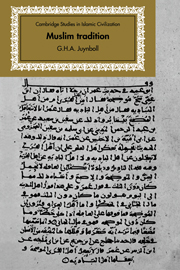Book contents
- Frontmatter
- Contents
- Preface
- Note to the Reader
- Introduction
- 1 A tentative chronology of the origins of Muslim tradition
- 2 The role of qāḍīs in the spreading of traditions
- 3 The man kadhaba tradition and the prohibition of lamenting the dead. An investigation into mutawātir traditions
- 4 An appraisal of muslim ḥadīth criticism. Rijāl works as depositories of transmitters' names
- 5 ‘Accepting traditions means knowing the men’
- Appendix I
- Appendix II
- Appendix III
- Appendix IV
- Appendix V
- Bibliography
- Index (glossary)
- Frontmatter
- Contents
- Preface
- Note to the Reader
- Introduction
- 1 A tentative chronology of the origins of Muslim tradition
- 2 The role of qāḍīs in the spreading of traditions
- 3 The man kadhaba tradition and the prohibition of lamenting the dead. An investigation into mutawātir traditions
- 4 An appraisal of muslim ḥadīth criticism. Rijāl works as depositories of transmitters' names
- 5 ‘Accepting traditions means knowing the men’
- Appendix I
- Appendix II
- Appendix III
- Appendix IV
- Appendix V
- Bibliography
- Index (glossary)
Summary
This book deals with various aspects of the formative period of Muslim tradition, in Arabic: ḥadīth; throughout this study the term ‘tradition’ is used as the equivalent of the Arabic word ḥadīth and is to be understood in this sense only. A ḥadīth proper is the record of a saying ascribed to the prophet Muḥammad or a description of his deeds. In the course of time these records were compiled into a number of collections which together form the so-called ḥadīth literature. Several of these collections acquired so much prestige that they became sacrosanct in the eyes of the Muslims and, subsequently, were vested with an authority second only to the Qur'ān.
When, in the mid-sixties, I wrote my study on modern Muslim discussions about the authenticity of the ḥadīth literature, I realized that I did not take sides, neither in the disputes among Oriental scholars nor in the ones occasionally flaring up between Oriental and western scholars. I had been influenced by the books of Goldziher and Schacht, of course, but also by those of modern Muslim scholars, and I kept postponing my commitment to any particular point of view. Initially I thought of the problems raised by Oriental and western scholars concerning the origins of ḥadīth as mutually irreconcilable. If two points of view could differ so widely, how could anyone even attempt to bring them into harmony?
- Type
- Chapter
- Information
- Muslim TraditionStudies in Chronology, Provenance and Authorship of Early Hadith, pp. 1 - 8Publisher: Cambridge University PressPrint publication year: 1983



